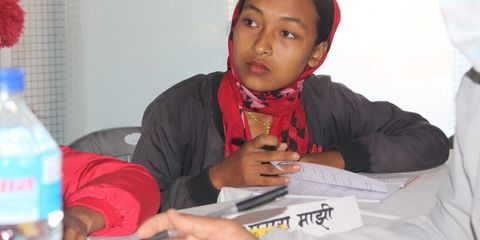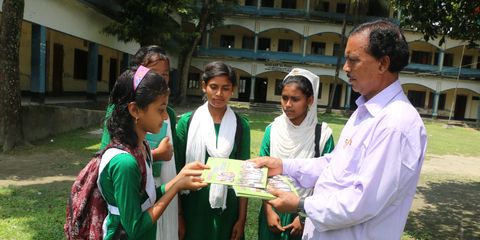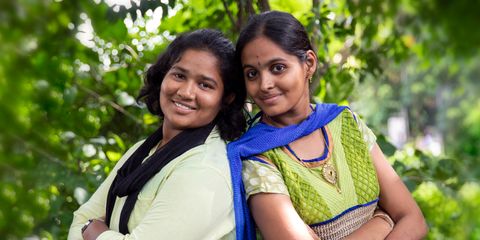Let’s Talk: Helping teenagers get the right answers about sexual health and child marriage
In Northern Lombok, classrooms are changing. In many schools, teenagers can be seen openly discussing and asking questions to teachers that were once considered taboo.
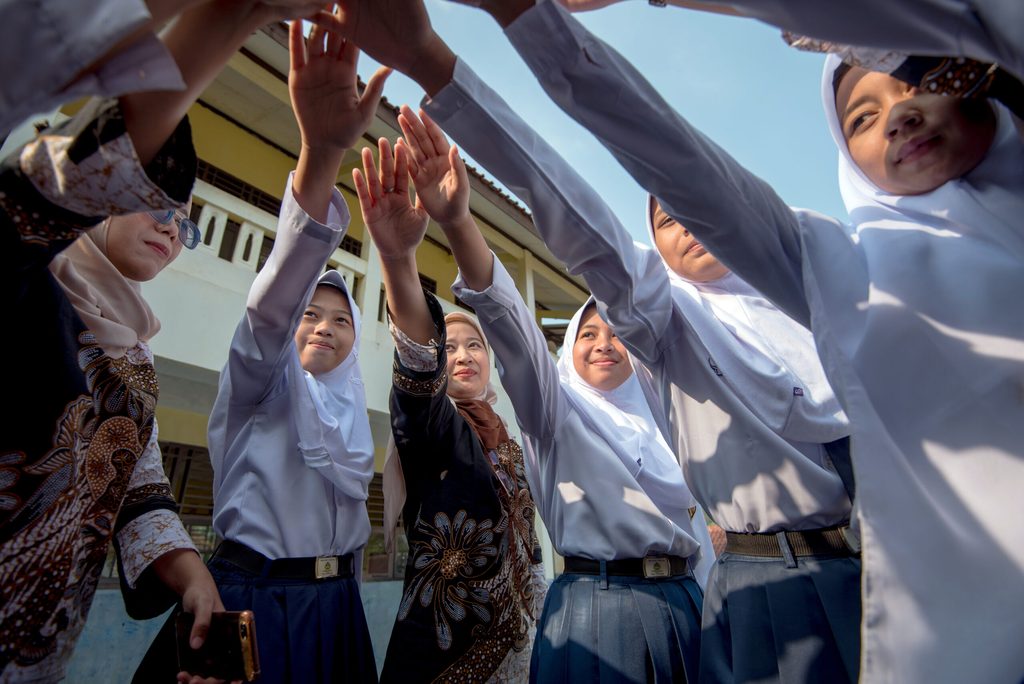
Among the usual topics of school, music, and the latest gossip, students are also meeting to talk over issues like child marriage and early pregnancy, parenthood, reproductive health and the roles and responsibilities of boys and girls. Questions like “Is it ok for a girl to get married young?” are confidently asked and answered. As debate typically ensues, one thing is clear: these are no ordinary meetings of teenagers.
Instead, many teenagers have been meeting regularly as part of the Let’s Talk program, an information-sharing forum among peers created and supported by Yayasan Plan International Indonesia. While many young boys and girls might ordinarily be embarrassed to discuss such subjects in the open, Let’s Talk allows teens todebate sensitive topics that are on their mind in a productive and informative peer counseling group.
Government partners in both the City of Mataram and District of North Lombok have supported the implementation of this program, believing in the potential Let’s Talk has for adolescents to learn from each other.
“I hope that teenagers in Mataram and North Lombok have a better understanding of the negatives effects of child marriage and are able to choose a better and healthier life”, said Dr. H Lalu Fatwir Uzali, S.Pd., M. Pd, Head of Mataram’s Health Office, at the launch of the Let’s Talk program.
One participant in this project and peer educator, Bela, said: “I feel happier because I know more and get all the positive knowledge I hadn’t learned before. I also started to understand the difference between positive and negative behavior that might impact my life, especially avoiding risky behaviors and rejecting the practice of child marriage.”
“I hope that teenagers in Mataram and North Lombok have a better understanding of the negatives effects of child marriage and are able to choose a better and healthier life”
Let’s Talk’s objective is to empower youths, particularly vulnerable girls aged 13-18 affected by COVID-19 to make informed decisions about their sexual and reproductive health, contributing to the prevention of risky behavior and child marriage, in the West Nusa Tenggara Province. The initiative is premised on the idea that peer pressure can be used as a positive force since teenagers listen closely to their peers. The project’s ultimate goal is to help teenagers reach their full potential.
Significantly, Let’s Talk is not just for girls. Teenage boys and girls are encouraged to learn from each other. They openly discuss the causes and impacts of child marriage and motivate themselves to make the best decisions regarding sexual and reproductive health rights. As well as prevention of child marriage during the COVID-19 pandemic.
“After taking on the role as a peer educator, the change I felt was knowing the parts of my reproductive organs, knowing what child marriage is, the dangers of it, how to avoid child marriage and help others to do the same,” said I Dewa, a peer educator boy.
The school leading by example
Support from all areas of the community is paramount when fighting child marriage. To effectively implement Let’s Talk, it was essential to get teachers, principals, and parents involved.
One such junior high school in Lombok is leading the way. In the school, every year there are students who become victims of child marriage. Like many schools in the area, it welcomes students with various social problems such as poverty, divorce, domestic violence, neglect, drugs, and teenage pregnancy – factors that often lead to child marriage. Yet, it has been a beacon of change
School Principal H.Suraji had observed these links to child marriage for a long time. His great concern for his students led him to directly involve himself with Let’s Talk. He ensures every single student in the school participates, and he is actively in dialogue with parents to dissuade them from marrying off their children.
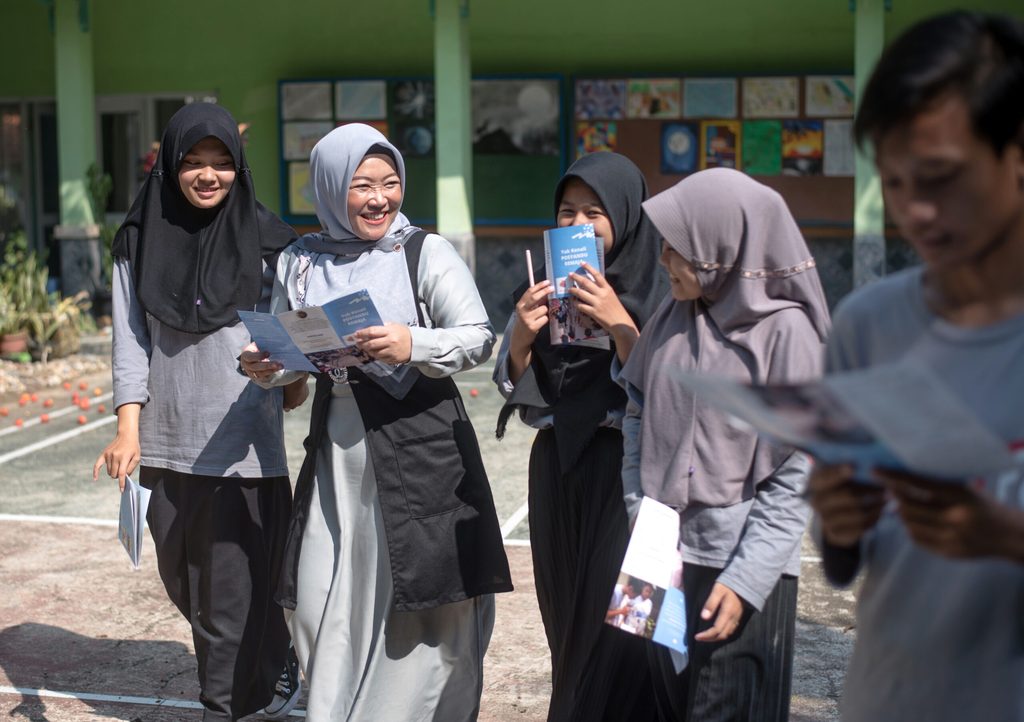
“First and foremost, it is important that all students take care of each other, and that teachers are motivating their students to do this. Before I retire, there should be no more child marriage at this school,” said Suraji. “Let’s Talk has brought immediate results. Students, especially peer educators, have increased their confidence and are opening up! I can see they will be this generation’s success stories.”
Child marriage and adolescent pregnancy is a serious problem in Indonesia. More than 2,000 cases of teen pregnancy were recorded in North Lombok in 2019 alone. 805 child marriage dispensation requests occurred in this area in 2020, a 59 percent increase from 2019 when 332 child marriage dispensation requests were registered.
The causes of this, especially in rural areas like North Lombok, are diverse, including poverty and cultural norms. But there’s another factor at play: the limited access of teens to sexual and reproductive health information and facilities. This situation has worsened owing to COVID-19, since health facilities are stretched, and others health services have moved online.
By removing the shame and stigma from talking about sexual health and child marriage, Yayasan Plan International Indonesia believes the project has created collaboration between diverse people and a positive change in the lives and health of young people.
“Now I know more about the impact of child marriage, maintaining a healthy body, using social media well, living a healthier life, maintaining healthy friendships, and staying away from negative comments and content on social media,” said Arkenzy, one of the female Let’s Talk peer educators. “I am giving more care to my body, and I will continue to advise my friends not to engage in risky behaviors and not to get married when they are still children.”
“I am giving more care to my body, and I will continue to advise my friends not to engage in risky behaviors and not to get married when they are still children.”
Let’s Talk
Yayasan Plan International Indonesia developed the Let’s Talk initiative to create a group of youth educators who would be able to train their peers on topics like adolescent pregnancy, child marriage, drug abuse and gender-based violence. Uneven access to sexual and reproductive health information and services was identified as barriers preventing girls from leading healthy lives. Through a gender-sensitive environment, young people and children, boys and girls, can access information and services supporting their sexual and reproductive health rights, enabling them to make the right decisions for their futures.
In North Lombok Let’s Talk is strongly supported by diverse community stakeholders, including the Mayor of Mataram, the Office of Education and Culture in West Nusa Tenggara province (NTB), the Health Office NTB, the Office of Women’s Empowerment, Child Protection, Population Control and Family Planning NTB, NTB Children’s Forum, City of Mataram, and NTB Child Protection Agency.
Education, Emergencies, Girls Get Equal, Sexual and reproductive health and rights, Youth empowerment, Activism, child marriage, Comprehensive sexuality education, COVID-19, Education in emergencies, Menstruation, Teenage pregnancy
